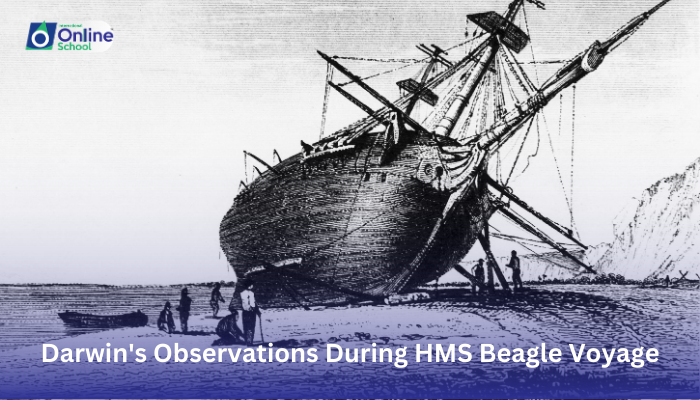
Learning Outcomes:
i. Understand the key observations made by Charles Darwin during his voyage on HMS Beagle.
ii. Recognize the significance of Darwin's fieldwork in shaping the development of evolutionary theory.
Introduction:
In this lesson, we will explore the fascinating journey of Charles Darwin aboard the HMS Beagle and delve into the observations that laid the foundation for his groundbreaking ideas on evolution. By understanding the specific details of Darwin's experiences during this voyage, we can gain valuable insights into the origins of the theory of evolution.
i. Observation of Biodiversity:
Darwin's journey on the HMS Beagle exposed him to a wide range of ecosystems and species. He observed a remarkable diversity of plants, animals, and geological formations across different regions. For instance, in the Galapagos Islands, he noted variations among similar species on different islands. The distinctive beak shapes of finches, later known as "Darwin's finches," showcased adaptive evolution in response to different environmental conditions.
ii. Fossil Discoveries:
During his travels, Darwin encountered fossils of extinct organisms, which intrigued him. Fossilized remains of ancient creatures found in South America and other locations provided evidence of species that no longer existed. This sparked Darwin's contemplation on the concept of species changing over time.
iii. Geological Observations:
Darwin closely examined the geological features of the places he visited. Notably, the uplift of the Andes Mountains and the presence of marine fossils on mountain peaks led him to propose that these areas had undergone significant geological changes over time. This understanding contributed to his broader ideas about Earth's history and the gradual processes shaping life.
iv. Interaction with Indigenous People:
Darwin engaged with diverse cultures and societies during his travels. Interactions with indigenous people, such as the natives of Tierra del Fuego, provided him with insights into human variations and adaptations. This exposure influenced his thoughts on the universality of certain human traits and the role of natural selection in human evolution.
Charles Darwin's observations during the HMS Beagle voyage were instrumental in shaping his theory of evolution. The vast array of life forms, fossil evidence, geological phenomena, and cultural interactions he encountered fueled his curiosity and prompted him to develop a revolutionary perspective on the interconnectedness and adaptation of living organisms. By appreciating the richness of Darwin's fieldwork, we gain a deeper understanding of the origins of evolutionary theory and its profound impact on the field of biology.